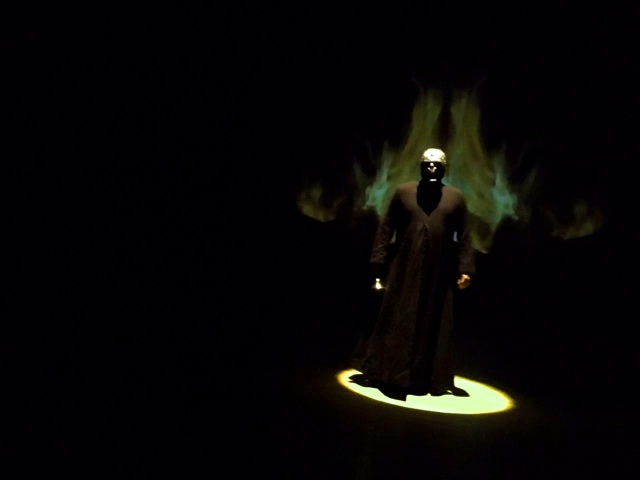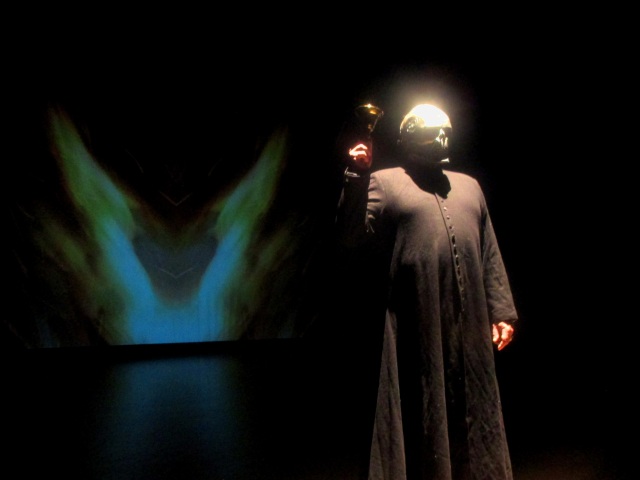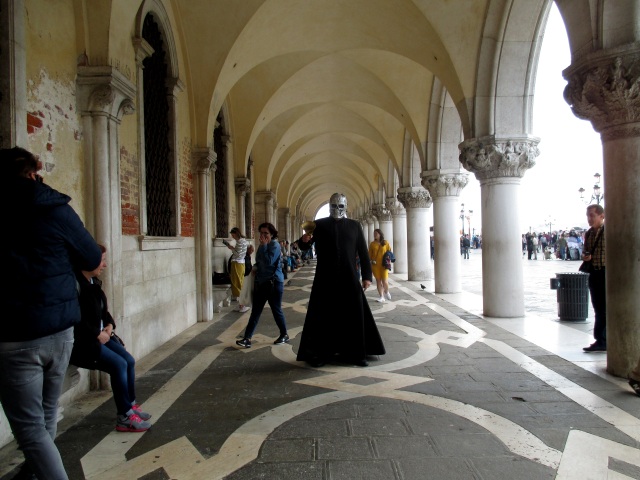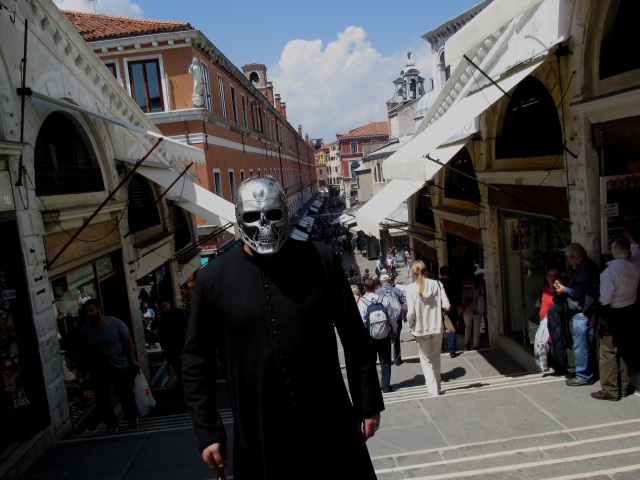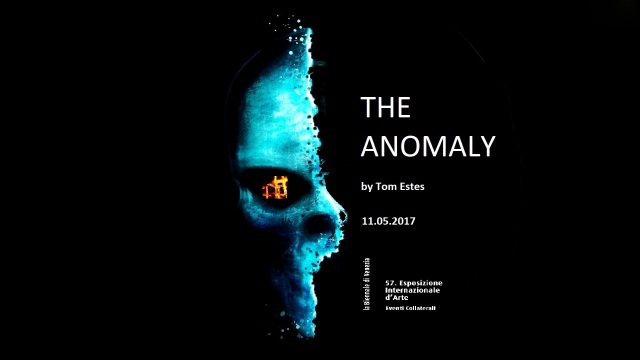Chosen by high profile judges from over 900 entries from around the globe, The AVBIV Selected Artists for 2017 at La Biennale di Venezia include Tom Estes’ Live Art Performance: The Anomaly
Tom Estes‘ Live Art performance, The Anomaly, plays on issues of censorship in the cybersphere. The performance is based on a scene from Cinema Paradiso in which a priest rings a bell in order that the projectionist cuts certain imags from films before public viewing. The costume is a fusion of characters from The Terminator and The Matrix and so is reflective of our on-going relationship to censorship and images on the web.
Tom Estes‘ Live Art performance, The Anomaly, plays on issues of censorship in the cybersphere
Many of us often see the Internet as impossible to control based on its very structure, as it gives everyone access to a democratic form of communication free of government control. The Great Firewall of China shows us that it isn’t quite that simple — the Internet has its bottlenecks where censorship can be instituted and technologies abused to aid in censorship. From China’s blocking and filtering system, Singapore’s class license system, and the United States’ government-private partnership model we are dealing with an ideological thing: a perfectly seamless machine for the centralization of power that negates any criticism.
In the Western World, Net neutrality is about everyone having access to the ‘same’ internet. That means internet service providers (ISPs) should not generally interfere with what you can see online. They can sell customers packages with different overall speeds. But they can’t change data speeds for certain websites, or block them altogether. Net neutrality laws are different in different countries. The US has had very strong regulations, which were enshrined under the Obama administration.
In America, the Federal Communications Commission (FCC) recently revealed plans to overturn the rules brought in under Obama. The FCC’s chairman, Ajit Pai, said the proposals would make the federal government “stop micromanaging the internet”. But there have been protests from many of the biggest web firms and outcry from thousands of consumers. More than half a million people have reportedly called Congress to register their objections. Facebook vice president Erin Egan said the FCC proposal fails to “ensure the internet remains open for everyone”. She said Facebook would “work with all stakeholders committed to this principle”. Likewise, Netflix has said the FCC plan “defies the will of millions of Americans”.
Net neutrality means ISPs have to follow strict regulations. And, without these, there might be more potential for them to make money. For instance, video streaming websites might pay them to prioritise their content. They could also charge consumers different prices, depending on the package they chose. Supporters of net neutrality say regulations help prevent a ‘two-tier’ internet – with some people getting a limited or slower service. Without neutrality, they say smaller web firms could struggle to compete against more established ones who have deals with ISPs. On the other hand, ISPs claim that regulations slow down innovation because it makes networks less profitable.
Obamacare for the internet. That was how, at the height of the 2014 primary season, the Republican presidential hopeful, Ted Cruz, referred to the net neutrality rules proposed by the Obama administration. Designed to safeguard equitable access to the internet, they were enacted the following year. But they suffered a significant, albeit expected, blow when the US telecoms regulator, chaired by a Trump appointee, voted to ditch them.
Net neutrality is the principle that internet service providers should not be able to charge different content providers different prices for transmitting data to their consumers. Strong net neutrality rules would prevent a big company such as Netflix from paying an ISP to guarantee faster access to its content than its competitors, or offer unlimited data access to Netflix bundled in as part of a broadband or mobile contract.
Like any rational monopolist, these companies will exploit a lack of net neutrality to maintain their dominance to the detriment of consumers. Facebook has publicly come out in favour of net neutrality in the American public debate. But it is aggressively capitalising on the absence of net neutrality in the developing world, where it is seeking to quickly expand its eye-watering consumer reach encapsulated in the fact that a quarter of the world’s population now have a Facebook account. It has been pressuring mobile network providers to offer free access to a very limited slice of the internet, including Facebook, for consumers who cannot afford to pay for internet access, and without a hint of irony, self-labelling it “philanthropy”.
Internet service providers point to the fact that YouTube and Netflix between them consume half of internet bandwidth. How are they supposed to future-proof our broadband infrastructure if they can’t charge them for access to their customers? This argument is a sham. The fundamentally uncompetitive broadband market means any extra revenues are far more likely to be pocketed by shareholders than invested in improving the infrastructure. And consumers are anyway already paying considerably for that data through their broadband packages.
Laws are weaker in many countries, meaning ISPs can offer different packages and give preferential treatment to selected services. In New Zealand, for instance, mobile users can pay to exempt Facebook, Instagram, Snapchat and Twitter from their monthly data limit. Other social media is not included and the data caps still apply. At the moment, not having net neutrality is most noticeable on mobile networks, rather than home broadband.
“That’s simply because most home broadband no longer has a data cap,” according to Professor Chris Marsden from the University of Sussex.
“The idea is that you provide specialised services for favoured applications,” he told FactCheck.
“At the moment, that’s about providing zero-rating stuff on mobiles, so it doesn’t reach your monthly limit. But in future, it could be about providing faster access for certain selected services, such as video, than what you get on your regular internet.”
The issue has been less controversial in the UK, partly because the ISP market is more competitive. One British politician has pointed out: “Unlike in the UK, in some parts of the US consumers have no choice which ISP they use because only one offers a service in their area.” That means – without net neutrality – some US consumers may have no choice but to accept whatever packages their ISP offers. In the UK, net neutrality rules are enshrined in EU law. But before this, all the major ISPs had already signed up to a voluntary Open Internet Code. This made promises such as not blocking services or damaging the services of competitors. Recent EU rules were more thorough and have received both praise and criticism. Joe McNamee, of the European Digital Rights, has said that Europe is “a global standard-setter in the defence of the open, competitive and neutral internet”. But Konstantinos Stylianou from the University of Leeds School of Law said it was “overkill”. And the former head of Ofcom has warned that “over-prescriptive and detailed legislation may deliver the opposite of the intended effect”.
So the fight for net neutrality must be seen in the context of an even bigger debate. Is the internet something to be ruled over by all-mighty private companies with little oversight from the state? Or do we recognise it as too fundamental to our security, to the way we communicate, and to our economy, to leave it vulnerable to the cowboy tactics so often deployed when the private sector spots an unregulated monopoly? The worldwide web’s founder, Sir Tim Berners-Lee, worries that “the system is failing”. He’s right. It’s time to finally treat his invention like the public utility it has definitively grown to become.
Estes performed The Anomaly at various sites around Venice from May 11th to 14th. Chosen by high profile judges from over 900 entries from around the globe, The AVBIV Selected Artists for this year at La Biennale di Venezia include Tom Estes’ Live Art Performance: The Anomaly. Documentation from Estes’ performance will also be on display at a champagne reception hosted by The Biennial Project at ARTIsm3160

